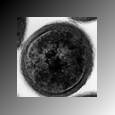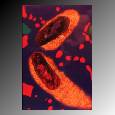 |
 |
Listeriosis
![]()
|
Cause and Transmission (Epidemiology): Listeriosis is a serious infection caused by eating food contaminated with the bacterium Listeria monocytogenes. The disease commonly affects primarily pregnant women, newborns, and adults with weakened immune systems, although otherwise healthy adults could also get infected. Listeria monocytogenes is found in soil and water, so vegetables can become contaminated from water or manure fertilizer that has the bacteria, or cows can become infected and pass the bacteria to meat and dairy products. Unwashed produce, uncooked meat, soft cheeses, cold cuts from the deli, or unpasteurized mild can all contain the bacteria. How It Affects the Body (Pathogenesis): Signs and symptoms of Listeriosis may include fever, muscle aches, nausea, or diarrhea. If infection spreads to the nervous system, symptoms such as headache, stiff neck, confusion, loss of balance, or convulsions can occur. Infected pregnant women may experience only a mild, flu-like illness, but infections during pregnancy can lead to premature delivery, infection of the newborn, or even stillbirth. Listeria is killed by pasteurization, so proper heating procedures should kill the bacteria. |